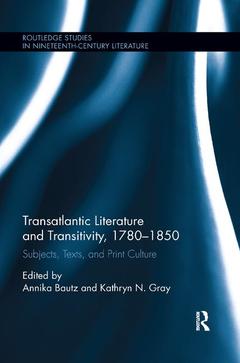Transatlantic Literature and Transitivity, 1780-1850 Subjects, Texts, and Print Culture Routledge Studies in Nineteenth Century Literature Series
Coordonnateurs : Bautz Annika, Gray Kathryn

This book makes an important contribution to transatlantic literary studies and an emerging body of work on identity formation and print culture in the Atlantic world. The collection identifies the ways in which historically-situated but malleable subjectivities engage with popular and pressing debates about class, slavery, natural knowledge, democracy, and religion. In addition, the book also considers the ways in which material texts and genres, including, for example, the essay, the guidebook, the travel narrative, the periodical, the novel, and the poem, can be scrutinized in relation to historically-situated transatlantic transitions, transformations, and border crossings. The volume is underpinned by a thorough examination of historical and conceptual frameworks and prioritizes notions of circulation and exchange, as opposed to transfer and continuance, in its analysis of authors, texts, and ideas. The collection is concerned with the movement of people, texts, and ideas in the currents of transatlantic markets and politics, taking a fresh look at a range of canonical and popular writers of the period, including Austen, Poe, Crèvecoeur, Brockden Brown, Sedgwick, Hemans, Bulwer-Lytton, Dickens, and Melville. In different ways, the essays gathered together here are concerned with the potentially empowering realities of the transitive, circulatory, and contingent experiences of transatlantic literary and cultural production as they are manifest in the long nineteenth century.
CONTENTS
Introduction
Part I: Travelling Subjects and Transitive Identities
Chapter One: Romancing the Slave Trade; Or, Reformation in Mansfield’s Park
Elizabeth Fay
Chapter Two: ‘‘That Dreadful, Delightful City": Edgar Allan Poe and the Transatlantic Essaying of London
Simon Peter Hull
Chapter Three: "Humble Auxiliaries to Nature": Go-Betweens and Natural Knowledge in Crèvecoeur’s Journey into Northern Pennsylvania and the State of New York
Kathryn Gray
Chapter Four: Writing Pocahontas: Romantic Women Writers and the Transatlantic Rescuing Indian Maiden
Melissa Adams-Campbell
Part II: Ancient Decline and Nineteenth-Century Moralities
Chapter Five: The Politics of Disaster in Lydia Maria Child’s Philothea: A Grecian Romance (1837)
Matthew Duques
Chapter Six: Christian Morality and Roman Depravity: Illustrating Edward Bulwer-Lytton’s The Last Days of Pompeii (1834) in a Transatlantic Literary Market
Annika Bautz
Part III: Transatlantic Print Culture and Transitive Texts
Chapter Seven: Virtual Museums in Early America: Transatlantic Magazine Culture and Cultural Memory
Julia Straub
Chapter Eight: Cultural Transfer in the German Atlantic: Brown, Oertel, and the First Translation of a U.S. Novel
Leonard von Morzé
Chapter Nine: William Blake’s American Afterlives: Transatlantic Poetics in Emerson and Whitman
Clare Frances Elliott
Chapter Ten: American Notes and English Guidebooks: (Re)Writing English Literature in Melville and Dickens
Katie McGettigan and Diana Powell
Index
Annika Bautz is Associate Professor in English at Plymouth University, UK.
Kathryn N. Gray is Reader in Early American Literature at Plymouth University, UK.
Date de parution : 12-2019
15.2x22.9 cm
Date de parution : 04-2017
15.2x22.9 cm
Thème de Transatlantic Literature and Transitivity, 1780-1850 :
Mots-clés :
Young Men; Brockden Brown’s Edgar Huntly; Literature; Window Dues; Research; Blake’s Prophetic Books; Transatlantic; Charles Brockden Brown; Transatlantic Literature; Transitivity; Natural Knowledge Production; Print Culture; Mansfield Park; Edgar Allan Poe; Blake's Poetry; Melville; Women’s Political Engagement; Nineteenth-Century Literature; Transatlantic Print Culture; Nineteenth Century Literature; Northern Pennsylvania; Early America; North American Landscape; Dickens; Transatlantic Discourse; Transatlantic Literary Studies; Fanny Price; Atlantic World; Translatio Studii; Austen; Romantic Era Women Writers; Elizabeth Fay; Martin Chuzzlewit; Simon Peter Hull; Transatlantic Circulation; Kathryn N; Gray; Women’s Historical Writing; Melissa Adams-Campbell; Female Biography; Matthew E; Duquès; Poe’s Text; Julia Straub; Familiar Essay; Leonard von Morzé; UK Publication; Clare Frances Elliott; Bertram Family; Katie McGettigan; Diana Powell



